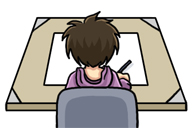
I’ve sat back and watched conversation after conversation over global manga; should it be called manga? Is it all garbage? A lot of these same statements and arguments have resurfaced in full-force recently due to the Tokyopop fiasco. Well I finally sat down to write down my views, and for what it’s worth, I’m sharing them with you. It’s long and feels like it turned into a bit of rant so apologies in advance (?). I welcome relevant, mature comments so feel free to share your thoughts at the end!
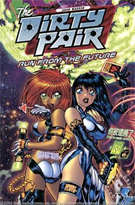 First, let’s get this out of the way first. Do I think that manga-styled books drawn out of Japan should be called manga? Yes, yes I do, personal preferrance. If it’s drawn with the style and intent to be like a manga, then call it a manga. I save the term authentic manga for that which comes out of Japan if more distinction is required. Manga has very distinct styles, pacing and appearances, and though diverse, it remains a type of graphic art all to itself. Excluding global manga because the artist isn’t Japanese is treatment that I don’t believe in.
First, let’s get this out of the way first. Do I think that manga-styled books drawn out of Japan should be called manga? Yes, yes I do, personal preferrance. If it’s drawn with the style and intent to be like a manga, then call it a manga. I save the term authentic manga for that which comes out of Japan if more distinction is required. Manga has very distinct styles, pacing and appearances, and though diverse, it remains a type of graphic art all to itself. Excluding global manga because the artist isn’t Japanese is treatment that I don’t believe in.
So what if an artist lives in Japan and publishes their work? Even if they were English born, German-born, from anywhere in world, but initially published in Japan, would that then make it manga? Is a person of Japanese descent who publishes their work, but is living elsewhere, thus not count as a manga artist? There’s also Korean manga, often referred to as mahn-wa, but ultimately referred to as manga by most with much less complaint. Things like this should not boil down to race and location; it’s the art and the story that should matter.
So many times on forums and blogs have I seen statements like these:
“If I see an English name on the cover, I know it’s crap and I’ll put it down right away. At least with a Japanese artist, I know I’m getting quality.”
You don’t get much more rude and disrespectful than that. You’re not making an assumption based on the artist or author themselves, you’re making assumptions based on their name, race and where they live. Everyone is entitled to their own opinions and I’m not saying that people aren’t allowed to dislike something, but in this case you’re not basing your issues on something, you’re basing it on someone; someone you’ve probably never met, someone you’ve never seen put hours and hours into what they love, someone who knowing they live on the same continent as you, in your mind, makes them inferior.
Another thought shared by many is that anything not produced in Japan is terrible, no exception: bad writing, bad drawing.
“I’ve never read a manga I didn’t like at least a little, but I know I don’t like any manga stuff made here because it all sucks. In Japan they atleast know how to do it right!”
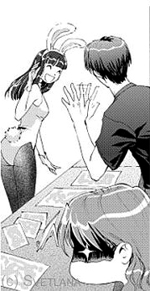 You have to love these statements, the ones that make it sound like every manga out there is a piece of gold. First of all, there have been millions of mangas published over the last thirty years; originals, doujinshis, one-shots, long series… do you honestly believe that they are all brilliant or good because the artist holding the pen was Japanese? Like with any other medium, the bad will generally always out weigh the good but it doesn’t mean the good isn’t there.
You have to love these statements, the ones that make it sound like every manga out there is a piece of gold. First of all, there have been millions of mangas published over the last thirty years; originals, doujinshis, one-shots, long series… do you honestly believe that they are all brilliant or good because the artist holding the pen was Japanese? Like with any other medium, the bad will generally always out weigh the good but it doesn’t mean the good isn’t there.
Keep in mind that what we see translated to English isn’t even the tip of the iceberg of this huge industry. What gets released is filtered, it’s chosen based on past selling records, popularity and demand. Publishers release what they believe will sell, something that’s proven to sell or already has a fan base, be it for the series or the artist.
As the manga phenomenon has only really taken off globally in the last decade, so too has the appearance of global manga. You’re reading stories found and released from a much smaller pool. While admittedly, yes, a lot of it is cheap, rushed material that is more about capitalizing on the ‘manga craze’ (like the hundred-and-one how to draw books out there), than really getting a new artist out there, there are still those who have definitely earned their praises.
Despite Tokyopop’s issues, past and prior, regarding their manga pilot program, Rising Star competition and publishing agreements, they have put out some great work by some very talented people. Svetlana Chmakova’s Dramacon, Jen Lee Quick’s Off*Beat, Rivkah’s Steady Beat; these are just some of the global mangas that I love and think are more than worth their space on any store shelf. Aoi House in Love by Adam Arnold and Shei, published by Seven Seas, is a hilarious well-written and superbly drawn comedic drama, and even Yaoi Press, despite a lot of its negative stigma, has been putting out some amazing work by the Spanish duo KOSEN, among some other newcomers. Even if these were hypothetically the only ‘good’ global manga out there today, they make up an impressive ratio to the number of lesser-quality books for such a new, up and coming global industry.
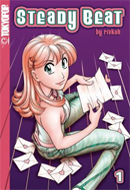 Another aspect that seems to get global manga artists a lot of grief is the treatment their books receive from publishers. As a prime example, I’ve come across a lot of annoyance from people on Tokyopop’s often over zealous advertising of Princess Ai, while series that people hold in much higher regard are left in the backdrop, nary a word about them and lost in TP’s mess of a website. Now allow me to remind people that I’m not in the industry so forgive me for this uneducated assumption, but it seems a safe assumption that artists don’t have this sort of commercial power. The power to say what gets promoted, hyped and focused on falls to the company, those in charge and the publicity and advertising staff. So when so-and-so’s such-and-such a series seems to be getting all this positive attention, maybe it actually means it’s worth checking out and reviewers want you to know or maybe it is just a pushy marketing scheme. Either way, in this case you should (proverbially) shoot the messenger, not hate the message.
Another aspect that seems to get global manga artists a lot of grief is the treatment their books receive from publishers. As a prime example, I’ve come across a lot of annoyance from people on Tokyopop’s often over zealous advertising of Princess Ai, while series that people hold in much higher regard are left in the backdrop, nary a word about them and lost in TP’s mess of a website. Now allow me to remind people that I’m not in the industry so forgive me for this uneducated assumption, but it seems a safe assumption that artists don’t have this sort of commercial power. The power to say what gets promoted, hyped and focused on falls to the company, those in charge and the publicity and advertising staff. So when so-and-so’s such-and-such a series seems to be getting all this positive attention, maybe it actually means it’s worth checking out and reviewers want you to know or maybe it is just a pushy marketing scheme. Either way, in this case you should (proverbially) shoot the messenger, not hate the message.
What also comes on a more personal note is the artists themselves, these people who often put their hearts, sweat and blood into these works that they work to share with you, often needing to work around full-time jobs or school. There are those who’re so quick to judge, so quick to insult. But as it’s been put so simply over a million things before, could you do better? Could you put your pencil where your mouth is? As an occasional art dabbler myself, the amount of work that I know has to go into each and every book is amazing and whether I like it personally or not, many still earn my respect for that alone.
Also through the wonders of the internet, and with less language barrier, we as readers are able to join these creators on their journeys: their inspirations, their roughs, their hard work, their dealing with publishers and their responses to our questions and comments. I love that aspect of global manga, so many opportunities to watch these stories and artists grow, instead of just receiving something that’s already seen publication long ago with very little chance of interaction with the creator. It adds a whole new element to the reading experience and I love it!
So there you have it, some of my thoughts. Do I think you have to like global manga or else be labelled as ignorant? Not at all. Am I saying you shouldn’t judge purely based on race and where they live? Simply put, but yes. It’s a story and an art form so let those be the judged. No, you obviously aren’t going to like it all (heck, you may not even like any), but you should give it as much of a chance as anything else, even if it’s so much as a good look at the cover art instead of the name tacked below it.


 Follow
Follow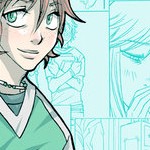
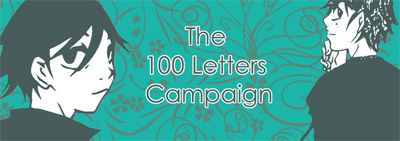
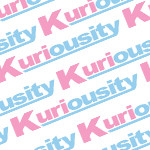






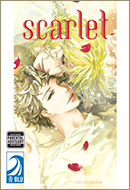








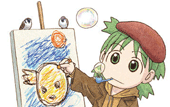









Dismissing all OEL manga as crap is definitely a rookie mistake…but on the other hand, I think Tpop's marketers act as though they think none of their books will sell unless they have the "manga" label slapped on them.
Take some of their most popular OEL series: I Luv Halloween and My Dead Girlfriend. Neither of them looks really looks like manga, so why try to force the "manga" title on them? There's nothing wrong with creating just "comics" after all, and these days the graphic novels will be shelved with the manga anyway. Obviously this doesn't apply to some other OEL titles like Princess Ai or DramaCon, which are visually very similar to manga…
But I guess TOKYOPOP just assumes its readers won't touch anything that's not labeled "manga." Thus allowing those few for whom that is the case to CONTINUE not touching anything that's not labeled "manga."
…I'm not entirely sure I buried a point in there somewhere, but those are some of the things I've been thinking on the OEL front lately.
@gia: Your point wasn't too buried. It's true that Tokyopop definately seems to have the mentality that if it's not labelled manga, then manga-readers won't touch it. While it's certainly not an entirely baseless thought at all, it's those thoughts that end up further fostering the mentality. A vicious cycle of sorts?
There seems to be too much alienation for graphic novels in general I find. Those who like manga generally tend to stick to manga and companies like Tokyopop support this trend by slapping manga labels on anything and everything they can. Meanwhile, though things are changing bit by bit, other comics and graphic novels tend to alienate manga readers for an assumed disinterest that may in fact not be there in the first place.
I remember getting into a slight amount of trouble at AnimeonDVD, when after starting a thread on domestic manga like Blue Monday, I was absconded for discussing non-japanese manga on their Manga Forums. Despite their reviewing Korean manga…. some of the forum members and even staff members had opinions very much akin to the little "It's Not Pizza!" guy in DramaCon [to be fair, not all though]. After kicking up a fair amount of fuss, I let things be, and after awhile, AonDVD suddently started reviewing OEL manga, and eventually other domestic manga from numerous companies fairly regularly, and don't seem to have that rule anymore, thank goodness.
But it does speak to this shady side of fandom, and shows just how readily established it's become despite decades of excellent work by domestic manga style artists.
[…] Manga: – Digital manhwa/manga/OEL provider NetComics has announced that they’re going to include American comics in their mix as well, starting with Ivan Velez Jr.’s Tales of the Closet. Which I think is awesome; I was just expressing some irritation over at Kuri’s blog that the popularity of manga seems to have led to some American comics-phobia. […]
Andre, if all that happened to you is that you were "admonished", which is the word I think you want, you were probably lucky. Things would get pretty heated over the OEL arguments on AoD.
OEL is only reviewed if a reviewer wants to review the material and is it not posted in the forum for manga, manhwa and other Asian comics. And it's not reviewed fairly regularly. I would estimate two volumes a month, if that many. I don't think the rule, if it is one, has changed, as much as there is an accommodation for those titles a reviewer might want to review and see posted.
If it’s drawn with the style and intent to be like a manga, then call it a manga.
I'll only accept that definition when someone can tell me what Dramacon has in common with Berserk, Planetes, and Fruits Basket that it doesn't also share with Spider-Man and Batman. I don't call Korean or Chinese comics manga either, any more than I'd call an issue of Superman a bande desinee.
If anything we feel like can be called "manga" then the word doesn't actually mean anything, in which case we already have an English word you're looking for: comic book.
I don't hate manga-influenced comics (I own pretty much everything Adam Warren's ever done), but I get annoyed that OEL supporters don't seem to want to think of themselves as comic book fans, just "manga" readers.
[…] Pattillo has penned a spirited defense of global manga at Kuri-ousity. Be sure to read the comments as […]
Manga has been a buzz word for a while now. I remember last year when IDW did a digest of their Transformers Beast Wars series and called it manga just because they had sized it the same as most manga. meh.
The things that Dramacon has in common with other manga and not American comics are conventions. You will never see Batman or Spiderman with a sweatdrop on their head, or turning into SD/Chibis. There are some things that manga does that American comics don't and never will.
I think that should be the dividing line. Does the the story/art use manga conventions, or are they just illustrated novels? I don't think Warriors should be called manga technically, but because it's from a manga publisher, it automatically gets that label.
Integra— well actually it was more along the lines of PM's from a mod telling me to keep whatever Koolaid I'm on to myself, and stop talking about OEL titles, lest I get in trouble. So yeah, not fun experience, though their forums are one of the better places for anime discussions [and Chris is a nice guy….I think part of it is just the vitriol some of the community have towards OEL which is sad].
Another random observation: I've run into a few OEL creators who get annoyed when their work is compared to manga, even though they market it with manga, and publish it with manga publishers.
It sort of felt like, you can't have it both ways– either you're going to call it "manga" deal with the comparisons, or you're going to have to call it a "comic" and sacrifice the marketing value that goes with being "manga."
My main problem with the manga-inspired artwork of much OEL manga is that it doesn't look as nice as manga from Japan.
Just because people mistakenly call comics from Korea manga doesn't mean it is manga. That's the same as calling all Asian people Chinese. If they all look the same to you, that means you aren't looking hard enough.
I don't blame the artists but the publishers for bastardizing the term. The Manga Bible? What the heck was that? It was a comic version of the bible that used no Japanese manga conventions and wasn't even the trastion TP size. Simply the word was used to move it off shelves and give the ininitiated a skewed introduction to manga.
I am interested in Japan, which is what keeps me reading my manga. An OEL manga can be flipped, B&W, the proper size and use all the speed lines and SD poses it can squish into 220 pages, but it isn't from Japan, doesn't have that cultural spice to it, and therefore, to me, will never be manga.
On an additional note for all involved- part of the reason some Manga creators sometimes fudge with what they label their work is due to both the vitriol from Manga fans towards domestic mangastyle comics [or domestic comics in general], and the vitriol against creators working in a manga-style dumped by SuperHero comics fans.
Joanna Estep's LJ entry about the whole TP mess of recent recaps some of these issues, and why it can be very disappointing and frustrating to make comics the way you want to sometime.
http://jou.livejournal.com/236738.html
@gia-Have you realized that though manhwa, manga, and manhua come from different countries, their art styles are very similar? Slight differences, obviously, but they are close. And that they form from the same word? And they deal with the same type of formula?
I view manga as an art style, with specific ways of telling a story, but with many exceptions and interpretations. Same with say, American comics, manhua, OEL manga or manhwa. They have their own quirks, but in the end, to me, they’re all “comic books”. Manga, manhua, and manhwa in their country merely MEAN comic books.
And it’s a little superficial to label comic, because artists’ drawings are all based on influences and their own personal tastes. A country’s artists might just gain a similar look because they’re exposed to art from THEIR country. Which is why now, OEL creators’ art looks like manga, because they are less exposed to American comics, but manga. It has little to do with their ethnicity, or origin, but rather what they’re exposed to, and what they like better. The manga label to me is an art form, not where the comic book came from per say. I have no problem calling Dramacon a manga because in all respect, the way it tells a story and the art is very very MUCH manga.
To me, OEL creators are not copycats, just working on an art form they love, though some ARE trying to capitalize on the craze. But a lot of OEL creators are working their butts of, with a lot less respect and privilege then mangakas in Japan where manga is considered an art form because they love it. I don’t appreciate people bashing them. (Not you, Gina. I think you told your point. This is just generally).
And you say you don’t read manga because it’s not the same as the one in Japanese. It does not have the quirkiness, the style, the off-beat fashion and Japanese culture, right? I agree. But can’t you see it applies to OEL manga as well? I suppose the novelty value isn’t there because you’re familiar with the Western culture already, but it’s fun to see your own culture sometimes. Which is why I like Dramacon, though that’s because Svetlana was satirizing it a bit, and still being so hilariously honest. Do you think the Japanese like manga because it shows their culture? Of course not, because that’s what’s “normal” to them. They’d find western culture more exotic because they’re not used to it, just like we do for manga. We take it for granted, and so do they. Each creator brings their backgrounds, their thoughts, and yes, their gender and their ethnicity and mixes it all in to bring a wonderful fusion. I love to see a manga based on Japanese folklore, or their modern pop culture (note Nana) but I also love to see Dramacon (about the big otaku trend in America), and The Dreaming (with its Australian and aboriginal influences). And OEL creators deal with issues Japanese manga do not, or from a different perspective. Steady Beat is about growing up and homosexuality taken seriously. (I do realize there ARE mangas out there that treat it seriously, but a lot is smut). OEL manga gives a very unique experience, just like manga gives you a very unique experience as well.
I love manga, but I view it as an art form, and I realize manga is just a way of trying to tell a story artistically. I base my views on a story on whether the story was good, and whether the art expressed the story well. I don’t really care about where the creator is from, so as long as I like it. Japanese creators have something to offer, but so do OEL creators. I love “authentic” manga, don’t get me wrong. I’m a huge shounen and shoujo fan. I love the humor, culture and uniqueness that the “authentic manga” shows us. But I also love the humor, culture, and uniqueness “global manga” shows.
Manga is a medium, an art form. Art should not be limited to one region, one culture. Might as well say only white people can sing pop, black rap, and keep jazz from outside America. I’ll grant it’s more popular IN the country, but if there are people outside interested, how can you possibly stop them from doing what they like? And how can you limit yourself from enjoying them, and seeing the uniqueness of each one?
Try an OEL manga. You might not like it. Fine, go ahead, try another one. I’m by no means saying all OEL is good, but don’t you dare close your mind off just because it’s not familiar to you. After all, manga was totally unfamiliar to the American audience. How many people bashed it? How many said it wasn’t artistic enough? That it was trash? That it wasn’t as good as a novel, or an American comics, that its influences and themes would never fly. Guess what? It’s huge. What makes you think OEL manga can’t be the same, only this time, it’s inferior to “authentic manga”? Each OEL manga is unique in its own way, and put aside everything and enjoy an OEL manga and judge for yourself. It is influenced by manga, but has its own themes and flavors based on its creators.
I love manga because it can reach out and inspire others to follow its path and branch into their own. If you’re going to condemn OEL creators for “following manga” instead of drawing their own stuff, guess what…EVERYTHING is influenced by something previous in its own way. Throw away all novels and music then, because I can assure you each has an influence that crept up in some way. The question is whether or not they do something different with it, not “copy”. And the best of global manga does that.
I hope I didn’t rant too long, but I feel really strongly about OEL manga, and manga in general. Let it GO people. Read the comic book for its own sake, not because the country where it came from. The art and story can be put down to personal tastes if you really don’t like it, but give it a TRY! I personally don’t like Batman, superman, ect. but I will say it has merit. That there IS something in there that make people like it. I’m not saying you have to love OEL manga. Some of you might really miss the exotic locations of Japanese manga, but realize it has its merits and own uniqueness and is LEGIT. And most importantly, READ SOME. You will surprise yourself with what you like.
I've only read a few OEL that i would say i liked. However for me the problem lies in the label. Are OEL manga. NO they are not, just as Korean and Chinese arent manga.
TP is famous for trying to push korean, and OEL stuff into the manga label, which is wrong IMO.
As for OEL stuff getting reviewed and more limelight, i've not found it the case. Speaking for myself, as a reviewer ill read and reiew anything thats sent to me, whether it OEL, Korean, Chinese or Japanese. However different types have a better chance of getting a good review from me. For example flaws in japanese or korean stuff would be usually overlooked, but the same flaws in an OEL or chinese one would get negative points.
Thats because korean and japanese are my preference, and what i like. Only a few OEL have ever caused me to do a double take and end up loving the series. YSquare being one of them.
People seem to forget that reviewers are humans to, we have our own personal likes and dislikes, and these always influence our reviews. Whether we ant them to or not.
I think those are great points, Tiamat's Disciple. Dark Horse has said part of the reason they can get such great titles from Korea is because they correctly call their comics manhwa and not manga. It may not mean much to the English-speaking audience, but it means a hell of a lot to the Korean creators and licensors.
"For example flaws in japanese or korean stuff would be usually overlooked, but the same flaws in an OEL or chinese one would get negative points"
I don't get how this is a good defense…. you might let it influence you, but it's still just an excuse.
Also, TP's not the only company producing OEL manga out there, and certainly weren't the first by a long shot. I kind of liked the term Amerimanga myself, which is abandoned due to fandom hate, but people are the way they are.
And Manwha and Manhua are just the korean and chinese pronounciatiosn of Manga. I'm sorry, but watching some of Japanese fandom's outright racism towards Korean manga over the years has left me with a bad taste. Shouldn't we try to elevate ourselves? And Tiamet, if you're seeing the same flaws in two different books, but only call one of them on it because it's not Asian, you do have to admit that's a little messed up. That's something you should try to improve upon, not brush aside.
Another issue with labeling- even if you just call it a comic, some [whether manga fan or superhero fan] will still dismiss your work entirely because it's in a manga style. It's been an issue since the 80's and Ninja High School, the 90's and Dirty Pair and Texas Steampunk GN's, long before anyone used the term corporately derived term OEL
[I love how companies keep coming up with terms to not peeve off purists, but purists still keep going- which all goes back to the artists can't win no matter what they do, and basically goes down to a lot of people's opinions, no matter how well worded, boiling to "Don't Draw Like That Cause I say so!" ]
I don't think critics have a right to tell me or anyonelse how they should be drawing, which is my primary issue with these kind of thoughts and opinions. They aren't based on quality, rather on some ephemeral idea that japanese artists have some kind of magical sparkle dust, or that drawing anything that's not a superhero comic makes your work crap. Both sides suck, and fandom sucks for it's willingness to go with these easy opinions. It's more fun to be a cynic, as they say.
Lori,
The things that Dramacon has in common with other manga and not American comics are conventions. You will never see Batman or Spiderman with a sweatdrop on their head, or turning into SD/Chibis.
You'll never see that happen in Berserk or Planetes either, which is why I specifically listed them as points of comparison. Does that mean they're not manga either?
@Joe Iglesias: Not to be the proverbial disturber, but you actually see those attributes (SD/sweatdrops) scattered throughout both series. True they have styles more grounded in realism, but they still have numerous aspects attributed to a manga style.
——-
The more these discussions go about, knowing that it all really comes down to people's opinions is often the end result. People will label things as they will, as I call OELs global manga and Korean work, mahn-wa. It's my choice and I don't expect people to adhere to it.
However, I feel (as several of you have brought up), that it's a matter of inclusion and exclusion. I don't think it's fair from a personal, and even professional point, to not call something with the style and intent to be a manga, a manga since I suppose, overall, I see the word as a clasffication. It makes it very hard to market global manga if you label it as anything else, as it alienates it from its intended audience. Meanwhile those who avoid/don't read manga, wouldn't embrace it either.
While sometimes, undeniably, classification as a manga is done too lightly (often to the dismay of artists themselves), it's professional publishing and these books need to find their market.
——–
“For example flaws in japanese or korean stuff would be usually overlooked, but the same flaws in an OEL or chinese one would get negative points”
I have to agree with Tiamat on this note, though perhaps not for entirely the same reason. This is a thought I come across a lot, and have fallen victim to myself before. A lot of times people see manga-style graphic novels as nothing but a rip-off or copy of an existing style (ignoring how diverse manga as a style is), and look at it as "If you're going to do it, you may as well do it right!". It's not right, and many times people forget that global mangas are often an artist's first work, where as much of what we get translated here is an artist's work after years of publishing, practice and life in the profession.
Also on that note, I pick at art styles regardless of where the book came from because I suppose as an artist myself, little things that seem unbelievably overlooked or lazy in someway, just stand out to me a lot.
'And Tiamet, if you’re seeing the same flaws in two different books, but only call one of them on it because it’s not Asian, you do have to admit that’s a little messed up. That’s something you should try to improve upon, not brush aside.'
Not really, manga is a specific genre, just as manhwa is a different one, and OEL are equally different. They may have similarities, but they are totaly different. Is supper man or batman a manga?
I hate normal comics such superman and batman, which is rather odd since at one point i was one of the largest fans of Green Lantern and GReen Arrow. If i judge a comic on the same levels as a manga, the comic will always lose because i hate them.
This is nothing beyond personal preference and nothing to be ashamed of. I like manga more than comics, and i probably always will.
However the problem with publishers is that they try and con you into buying something by selling it as one thing, when in fact it's another. Manga comes from japan. Manga as a term is simply just the japanese form of comic, (possibly, i dont know japanese). However it also means an entire style.
Manga comes from japan, always has and always will.
OEL comes from the west, whether its american, english, canadian or french. It's OEL. Manhwa and Manhua also come from different areas ad carry all their respective differences. THere are similarities, but there are more differences.
Also, in general, alot ofthe OEL i've read have been pure garbage. Though i have to admit i haven't read many of them, so far i've only found two or three that i can reccomend to others.
Most of the OEL i've read feel to fake, as though they're trying to hard to emulate manga rather than trying to find their own style. This strangles the story , and ends up killing it
Not going to comment too much on the "is OEL manga real manga" discussion in this reply because it's been done to death. As far as I'm concerned if an OEL manga like Rosca's "Hollow Fields" is good enough to win a Japanese manga award then the discussion is over. More recently Rem's "Festival of Shadows" won another Japanese competition and was published in one of their magazines.
NB, those two examples are NOT Tpop works, which says something.
The problem is not OEL manga. The problem is Tpop. Specifically it was Tpop's cynical exploitation of the early manga market.
As Rivkah (another artist shafted by Tpop) described in her blog, TPop's marketing idea was akin to throwing spaghetti against a wall and seeing what sticks. Tpop chose to put out a flood of really, REALLY terrible OEL mangas and related products. As a result some people (years latter) still tar all OEL with the same brush and still assume something that is in manga style but written by someone with a Western name is an unimaginative, rip off.
It's good to see Tpop's suffocating and harmful hold on manga in the West is subsiding. Remember, they're not the only manga publishers out other!
Tiamet– I don't really see how Manga, Manwha, BD, Comic Books and such are "Genres"- they are terminology, and are also ridden with years of differing uses for these terms.
They have many meanings to different people, and it sounds like you got sold on the late 90's Tokyopop "Authentic Manga" label, which I'm guessing retroactively probably wasn't a good thing to label their titles for the industry [shooting themselves in the foot for their original works, which had been around since their Mixx days with Sushi Girl, and for other publishers, whether domestic manga or folks like VIZ].
Mystery is a Genre, so is Supense, Romance, Action Adventure, Fantasy, and even then these can meld and become somethingelse. As someone who's studied literature, I find your wording odd.
You are entitled to your opinion, but it doesn't negate other peoples, artist's own choices, or the longstanding history of domestic style works. Domestic manga have been around for over two decades now, and aren't going away- I also agree that TPop's choices [good and bad] play a large role in all of this- a number of experienced, critically praised comic artists and writers chose not to work with TP due to their poor terms, such as Lea Hernandez, Warren Ellis, and Adam Warren, and I think this hurt them- they could of had a lot of slick content with a built in audience of existing fans of these creators. It's someonelses victory though, as the graphic novel market continues to expand, and manga readers seek out more then just TP.
I agree with Andre that we're pretty much stuck with the term "manga" applying to OEL comics, whether we like it or not. The fact is, these kind of cultural terms are pretty hard to control, once they get out. If people want manga, the industry gives them manga, that's what you get for living in a commercial society, I guess.
Also, I don't know a whole lot about the manga industry in general, but from what I understand, the manga industry in Japan is HUGE. I mean, really huge. It's an important part of their economy, even. That being said, most of the Japanese manga artists with top-selling manga (ie, the ones that generally make it here to North America and abroad) are artists who work with teams of other artists, and have been working for a while to become successful. Their manga are sleek, professional, and polished. At least the ones you see now. But often, if you go back into a manga artists' past and are able to find the first few manga they made, you can see marked differences in the quality of their art and the look of their manga. Everybody has to start somewhere. I think this is true of OEL – it's a much smaller industry that is in its infancy, really, leaving the artists to do a great deal more of the work themselves, and of course a smaller pool of artsits to choose from- not to mention (as other people have) that of course they are going to be influenced by other art styles from their own culture. That may explain why some people feel the art "isn't as good" as what they see in Japanese manga. I do agree that I think it's kind of silly to take the Japanese term for "comics" when we already have one, but at the same time the word has morphed into more than that to become a much broader definition of an art style, and not one that is particular to any one country. It may not have always been the case, but having studied linguistics I can tell you that taking a word that means one thing and adapting it to mean other things, or more things, is certainly NOT an uncommon phenomenon. Heck, the Japanese do it all the time with English words.
We can thank manga, and largely Tokyopop, for making comics cool around here, and allowing altnernate comic styles to come about – not just OEL manga, but also plenty of "regular" comics, and they certainly don't fall into the typical Marvel style "American" comics genre, either. Plenty of artists with valuable stories to tell and art to share are getting their stuff on the market, whether it's being called manga or not. Even if you don't like them, I think that manga has really opened the door for the popularity of comics in general (there are other contributing factors, but I honestly feel like, from my own observation, the explosion in manga popularity has made people more open-minded toward comics in general).
I'm terrible at making my points, but what I'm trying to say is, worldwide, manga is taking on a life of its own, as are all sorts of comics. I think that whatever a comic is labeled should be far less important than what is inside that comic's cover – if a comic that maybe isn't really manga gets called manga, mistakenly or otherwise, I think it's totally absurd to dismiss that work or feel angry towards the artists simply because it's "mislabeled."
I could say a lot more about comics and manga, but I've probably rambled enough for now xD
[…] receiving so much response to my previous editorial-type post about global manga, I’m at it again (sort of?). Today I sat down and wrote some of my thoughts on manga publishers […]
good article and interesting argument regarding global manga!
But I must disagree with you on one point….All graphic novels cannot be called manga because of a similar art. Your comment: " If it’s drawn with the style and intent to be like a manga, then call it a manga" is problematic because what exactly IS the style & intent of a manga?
Manga is a story told through images..& in manga I have come across a wide variety of drawing styles & content/issues….moreover manga, manhwa & manhua(chinese) have different art styles, & within each category there are further different types of art/themes. So I think it would rather be safer to say that All of these are one and the same thing but named in different languages, ie graphic novels, manga, manhwa, manhua, etc are one and the same & u can call it any of them depending on your language of choice. This gives it more of a global feel & allows greater freedom to creativity without narrow definitions of 'manga' or 'comic'limiting them…